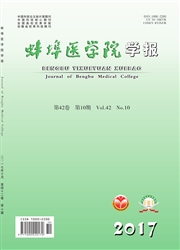

 中文摘要:
中文摘要:
目的:探讨护理干预对腹腔热疗联合TP方案治疗中晚期卵巢癌的影响。方法:选取接受腹腔热疗联合TP方案治疗的中晚期卵巢癌患者234例,随机分为对照组和干预组各117例。对照组给予常规护理,干预组在化疗和热疗前、中、后提示患者注意事项、密切关注患者生命体征及给予相关护理。对比分析2组患者近期疗效、不良反应和远期生存率。结果:干预组近期总有效率为69.2%,显著高于对照组的51.2%(P〈0.01);2组患者白细胞减少和过敏反应发生率差异均无统计学意义(P〉0.05),干预组恶心呕吐、肝功能损伤发生率均低于对照组(P〈0.05)。干预组1年和3年生存率分别是86.3%和54.7%,均高于对照组的72.6%和41.9%(P〈0.05)。结论:合理的护理干预方案不仅有助于腹腔热疗联合TP方案治疗中晚期卵巢癌患者近期疗效的提高,减少治疗后并发症,还能提高患者远期生存率。
 英文摘要:
英文摘要:
Objective: To investigate the effects of the nursing intervention on the moderate and advanced ovarian carcinoma patients treated with abdominal hyperthermia combined with TP program. Methods: Two hundred and thirty-four moderate and advanced ovarian carcinoma patients treated with abdominal hyperthermia combined with TP program were divided randomly into the control group and intervention group( 117 cases each group). The control group were conventionally nursed. In intervention group before,during and after chemotherapy and hyperthermia,the considerations were prompted,the vital signs were paid close attention to,and the relevant nursing was implemented. The short-term effects,adverse reactions and long-term survival rate between two groups were analyzed. Results: The short-term total effective rate in the intervention group( 69. 2%) was significantly higher than that in the control group( 51. 2%)( P〈0. 01). The differences of the incidence rates of leucopenia and anaphylaxis between two groups were not statistically significant( P〈0. 05). The incidence rates of nausea and hepatic injury in the intervention group were significantly lesser than those in the control group( P〈0. 05). The one-year and three-year survival rates in the intervention group( 86. 3% and 54. 7%) were significantly higher than those in the control group( 72. 6% and 41. 9%),respectively( P〈0. 05). Conclusions: The reasonable nursing intervention in moderate and advanced ovarian carcinoma patients treated with abdominal hyperthermia combined with TP program can improve the short-term effects and long-term survival rate,and decrease the complications.
 同期刊论文项目
同期刊论文项目
 同项目期刊论文
同项目期刊论文
 期刊信息
期刊信息
